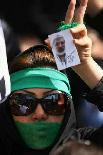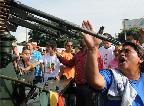President Obama’s speech to the Urban League about education July 29 didn’t cover any new ground, but there were some shifts worth noting. He tweaked his administration’s rhetorical stance towards teachers and teacher unions, adopting a less combative stance than his and Arne Duncan’s support for firing teachers in a “failing” Rhode Island school.
Teachers in Oaxaca: A Review
Diana Denham and the C.A.S.A. Collective, Teaching Rebellion: Stories from the Grassroots Mobilization in Oaxaca (Oakland: PM Press, 2008) and Peter Kuper, A Sketchbook Journal of Two Years in Oaxaca (Oakland: PM Press, 2009).
Green Is the New Green: Social Media and the Post-Election Crisis in Iran, 2009

The Persian language blogosphere is rich, varied, and dynamic. Of the 100 million blogs registered around the world in 2005, 700,000 were Persian language, either inside Iran or in the diaspora. Of these, over 60,000 are updated frequently. With over 20 million Iranians connecting to the internet, and over 600,000 Iranians signed up on Facebook by the presidential election of the summer of 2009, the Iranian cyber community is by far the most dynamic such community in the Middle East, and one that is unambiguously diverse.
Iran: Reform and Revolution
Recent news about Iran has been dominated by U.S. attempts to increase sanctions, and one could be forgiven for thinking the world hegemonic capitalist power is preparing war against a major nuclear power. The reality is far different: all the fuss is about a country where nine months of mass protests have not only weakened the state but also divided the ruling circles, making reconciliation at the top impossible.
Foosball with the Devil: Haiti, Honduras, and Democracy in the Neoliberal Era

From the perspective of Honduran and Honduranist scholars, the most common reference to Haiti is as a point of hemispheric comparison. Whether measuring GDP per capita, state legitimacy and citizens’ political tolerance, or corruption, the phrase “Honduras ranks last…after Haiti” seems to be de rigueur. This is no coincidence: the policies and structures that have effected extreme poverty and highly concentrated wealth in both places are very much connected.
Darfur: The World's Most Famous Humanitarian Disaster
The emergence of Darfur as a cause célèbre in the West has been one of the more notable propaganda achievements in recent memory. Though the Darfur region of Sudan has been the scene of great human suffering, a death toll of perhaps 300,000 and a population of displaced persons numbering well over 2 million qualifies Darfur as serious but — regrettably — hardly unique for the scale of its violence in the first decade of the 21st century.
Pakistan: The Myth of Civilizing War
It would hardly be an exaggeration to suggest that, today, in the baleful shadow of the Great War on Terror, one central site of intra-progressive discord has been the question of the broad Left’s relation to political and militant Islam.
You've Been Well Cared For
I was sitting in the homeless unit of the Grove Hall Department of Transitional Assistance (welfare department) chatting with some women. One was living in a homeless shelter in Saugus, a town on the north shore of Massachusetts; the other was applying for shelter. They were ashamed to be here. They said that they had worked and held responsible jobs. Life had dealt them raw blows. One had to leave her job because of an injury to her spine that seemed to require endless treatment, and she did not know when she could return to work.
Child Labor in the World Economy
A world away from us, in the straits of Malacca, between Indonesian Sumatra and Malaysia, approximately 2,000 fishing platforms, known as jermals, operate miles from shore. Fewer than 400 are officially registered with the Indonesian government; the rest operate illegally. These small fishing platforms are built from giant logs that are sharpened like stakes and dropped from barges into the sea floor in water up to twenty meters deep. They form an open-ended rectangular stockade to which smaller timbers are lashed horizontally.
Multiculturalism and Science
Multiculturalism has become mainstream. Across North America and Europe, school curricula are checked for accurate representation of non-Western and non-white cultures. Research examining the culturally conditioned character of all aspects of knowledge has not only gained a hearing in academic journals, but has sometimes been integrated into popular textbooks from kindergarten on up.
U.S. Libraries and the "War on Terrorism"
In the days and weeks following the September 11, 2001 Al-Qaeda terrorist attacks in the northeastern United States, there was a sudden proliferation of U.S. flags and other patriotic imagery in public libraries across the nation. U.S. public libraries have traditionally displayed U.S. flags inside or atop their buildings, even though they are financed by local and state tax money and receive little if any federal funding. But the new patriotic décor went well beyond any simple statement of solidarity with the nation in a time of crisis.
Roundups, Detention, and Other Phantoms of Lost Liberty
In an Alabama district court a few years ago, the Department of Justice made an argument familiar to those who have read immigration cases: it asked the court to keep its hands off. The department argued for what I call "double deference." First, the court should defer to the executive and legislative branches as a matter of course in immigration matters; and second, the court should defer to the jail where the plaintiff was being incarcerated since prison administrators need wide latitude in operating their lock-ups.
Sustaining Democratic Life: An Interview with the ACLU's Anthony Romero
This is a lightly edited transcript of an interview conducted by Mark Dow and Kent Worcester with Anthony Romero in April 2004 in his lower Manhattan office.
New Politics: Yesterday during the September 11 Commission hearings, when he was defending some of the Patriot Act measures that have been criticized, Ashcroft said that a lot of what the Patriot Act did was simply to extend measures that were already in existence.
Anthony Romero: Patently false.
Los Suns
It's not unprecedented for athletes here to object to racist policies, military invasions, and various other crimes and stupidities.
The raised, gloved fists of Tommie Smith and John Carlos on the podium at the 1968 Olympics provide the most dramatic and public example of athletes taking a public stand against oppression. For their courage, Smith and Carlos were demonized and hustled out of town by the U.S. Olympic Committee, though today they are celebrated, at least in some circles.
Sounding the alarm on "Race to the Top"
How can we make neoliberalism’s project to destroy public education, captured in the Obama/Duncan “Race to the Top” proposal, more understandable? The subject is complex, but bloggers in the US are taking up the challenge, as we see in Susan Ohanian’s excellent report on my work. (Thanks to all who have picked up the debate with Ravitch.)
What's right – and wrong – in Diane Ravitch's new take on school reform
Five friends, none of them teachers, have called to tell me they heard about Diane Ravitch’s new book and her change of heart about the school reforms she advocated for a decade. “Lo! She’s saying what you’ve been telling us!”
The publicity for Ravitch’s book has certainly put her incisive critique of the reforms (privatizing education; using standardized tests to measure everything; looking to “choice” and charter schools drive improvement) in the news.
Neoliberalism, Teacher Unionism, and the Future of Public Education
With overwhelming support from both Democrats and Republicans, the Bush administration rewrote the Elementary and Secondary Education Act (ESEA) in 2001, drastically changing public education. One of the key initiatives of the Johnson-era "war on poverty," ESEA has been the main source of federal aid to schools serving children in poverty.
No Child Left Behind: A Brainchild of Neoliberalism and American Politics
Neo-liberalism and neoconservatism are in the driver's seat right now and this is not only happening in education.
Michael Apple
Leaving Public Schools Behind
It is a measure of how far the right is reaching that the left today finds itself defending the very existence of public education from the forces of privatization, commercialization, and even federal policy. Just four years after 1996 Republican presidential candidate Bob Dole campaigned on a platform of abolishing the Department of Education, the Bush administration came into office with a massive expansion of the federal role in education as its number one domestic priority.
A Realistic Post-election Strategy to Modify NCLB
Thank God for Utah. The potential triumphalism of George Bush and his hold the course view of No Child Left Behind can be blunted. The Utah legislature set the tone in early 2004 with its frontal assault on the arrogance of the federal government in micromanaging the accountability standards of Utah's classrooms. The Utah legislature was on the verge of totally rejecting the federal funds following NCLB before the U.S. Department of Education sent emissaries to Salt Lake City to calm down the cry for state control.